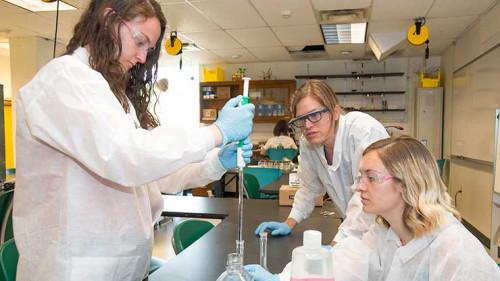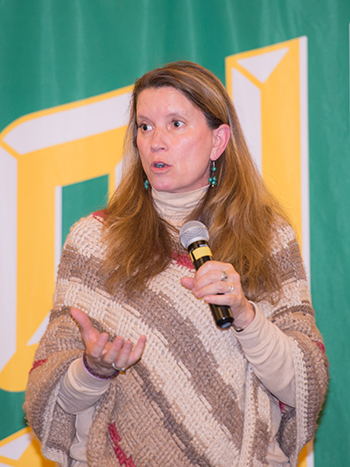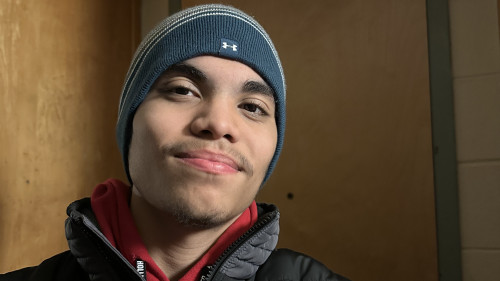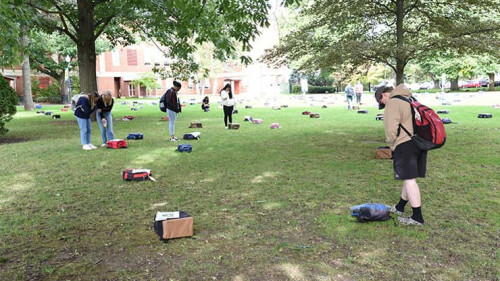

All of the employees of Thistle Farms have a criminal record. All were raped before they were teenagers. Nearly all of them are recovering from addiction.
These tribulations would make many other potential employers turn away from hiring them. But despite their heart-breaking struggles, you’d be hard pressed to find more dedicated and enthusiastic personnel.
Thistle Farms is a Nashville-based body care product company founded by Episcopal priest Becca Stevens, who spoke at Siena on February 8 for the annual “Ours to Do: Women Leading the Way” lecture. Thistle Farms offers safe housing and employment to women who are recovering from trafficking, prostitution, and addiction.
Brought to campus by the Sr. Thea Bowman Center for Women and other campus groups, Stevens met with about 20 students in the College’s Stack Center for Innovation and Entrepreneurship before heading over to the SSU to speak to a full house.
“As you develop your careers, make sure you embody your values,” Stevens encouraged the Stack Center group. “If you all become peaceful entrepreneurs, that would be revolutionary. What a way to walk out into the world.”
Stevens discussed what was previously known as “social entrepreneurship” but is coming to be known more often as “justice entrepreneurship.”
Thistle Farms residents and graduates earn income through one of four social enterprises. The company helps employ more than 1,800 women worldwide, and the national network has more than 40 sister communities.
Stevens said she chose to create and sell body care products and candles because “body healing is a beautiful way to serve these women.” She said a justice entrepreneur could just as easily market a service as a product, and speaking of marketing, she joked that “everyone these days wants to develop a marketing plan, but nobody wants to sell.”
Thistle Farms product labels say “Naturally handcrafted by women survivors,” and the company tagline is “Love Heals Every Body.” Their body butters, soy candles, essential oils, and more are sold at tables during speaking events, through the company website thistlefarms.org, and by stores such as Whole Foods.
“If you are thinking about doing justice work as an entrepreneur, don’t give up your ideals to achieve business goals. It’s not all about the margins,” she advised them in her Tennessee-accented twang. “A passion to help others is what we live our lives for.”
When she spoke to the Stack Center students about branding she asked, “How can you set apart what at first glance is just a pretty candle? How do you tell the story about who made it? How do you teach people to put their money where their values are?”
After the Stack Center meeting, Stevens headed over to her main talk in the SSU. Wherever she speaks, Stevens brings with her one or two of the women whose lives were turned around by Thistle Farms. Siena welcomed Jennifer and Tiffany for this event.
At the start of each work day the women join in a circle and light one of their handmade candles. They pray, commit themselves to the day ahead, and “shine a light for a woman who may still be trying to find her way home.” A candle was lighted at the start of the Siena lecture by Jennifer.
The Siena audience was treated to the world premiere of the music video “Love Heals,” which featured Thistle Farms women. It was written by Stevens’ husband, Grammy winner Marcus Hummon.
Stevens, who was a CNN Hero of the Year and was named Humanitarian of the Year by the Small Business Council of America, acknowledged that there is “a lot of work to be done” by those who want to create a better world.
“There are a lot of people out there who need you. Let justice be the worship.”
If you missed Stevens’ talk but would like to support Thistle Farms, the products are sold during Siena’s Roots Café lunches on Wednesdays in Snyder Hall, or through their website.

